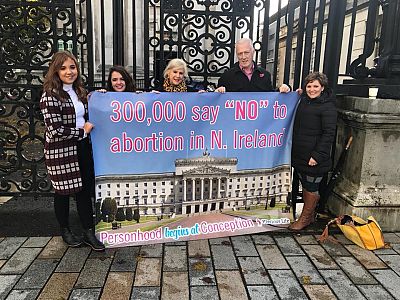Update: Abortion Pills Case at Belfast High Court
Precious Life were present again today (7th November 2018) at Belfast High Court as a witness for life as the North’s abortion laws continue to come under fierce scrutiny and attack. A woman who illegally bought abortion pills for her underage 15-year-old daughter was back in court yesterday (November 6th) to challenge the decision to prosecute her for breaking the law.
The anonymous woman is facing accusations of procuring dangerous abortion drugs for her daughter, who used them to cause an abortion. The woman is facing two separate charges of unlawfully procuring and supplying the abortion drugs mifepristone and misoprostol with the intent to procure a miscarriage.
The mother's barrister is insisting that she acted in her daughter's "best interests".
During court proceedings, a barrister for the mother urged judges to rule that the looming prosecution is in contravention of human rights laws. The woman is taking a judicial review in Belfast High Court against the decision to charge her for procuring illegal and dangerous abortion pills online. The case, known as JR76, represents the latest challenge to Northern Ireland's pro-life laws.
‘Opening the door’ for further unregulated use of abortion pills
Yesterday, Precious Life were in Court to listen to the proceedings. The three judges immediately argued that not prosecuting women for breaking abortion law could “open the door” for further unregulated use of abortion medication bought over the internet. Lord Justice Gillen presented a hypothetical scenario of one of the woman's neighbours also deciding to seek abortion pills online, but doing so through a "cowboy outfit" that paid little regard to safeguards.
"Does that mean woman A would be prosecuted and woman B would not?" he asked. The judge added: "It could open the door to parents trying the best they can, but being totally ignorant of what the appropriate safeguards are."
The court acknowledged the girl had found herself in a "difficult and sensitive dilemma" but questioned what the outcome might be if the judicial review was upheld. "Then we would in effect open the door to every child in this dilemma - and it's a difficult and sensitive dilemma - they would know this is a course they could take without the risk of prosecution," he said.
Dangerous abortion pills illegal throughout other parts of the UK
Lord Justice Weatherup argued that while the drugs were legal in other parts of the UK, they were only supposed to be taken in a controlled environment under medical supervision, adding: "That's obviously for public health reasons."
Ms Quinlivan meanwhile insisted the stipulation in Great Britain for the pills to be taken under supervision was an "historical" issue related to old legislation and not a clinical necessity.
However, presenting the case for Northern Ireland's Public Prosecution Service, Dr Tony McGleenan QC said the parties in the case "differ fundamentally" on the potential consequences of taking the medication without supervision.
He said there were "dangerous risks" inherent with self-administration. He added that those were particularly acute in cases of ectopic pregnancies - when a fertilised egg implants itself outside of the womb - and said that was why anyone who takes the pills should have an ultrasound scan before doing so.
The dangerous consequences of choosing not to prosecute
Mr McGleenan said "international medical norms" advised that the drugs should be taken under clinical supervision, citing the World Health Organisation as one of the authorities advocating that approach. "It's not an historical anomaly or artefact related to legislation," he said, "it's a matter of safety and appropriate clinical care."
Mr McGleenan said if the PPS opted not to prosecute such cases it would encourage others to use the drugs without supervision. "A no-prosecution stance is essentially validating the widespread abuse of this medication outside of a clinical context," he said.
NI abortion law ‘still valid’
He noted the Supreme Court judgment, but stressed that a formal "declaration of incompatibility" had not been made, so the relevant sections of the 1861 legislation criminalising abortion in Northern Ireland were still "valid".
Ahead of the hearing on Tuesday morning, pro-life and pro-abortion campaigners gathered outside the court with placards and posters.
Precious Life Commentary on the Case
Precious Life Director Bernadette Smith said, “The Supreme Court judges’ statement on Article 8 was merely ‘opinion’ and not legally binding, so cannot be used to advance an abortion agenda in Northern Ireland. Article 8 of the ECHR must not be used to override any breaking of the law here. There is no ‘right to abortion’ – but there is a ‘right to life.’ The right to life of all members of the human family is enshrined in internationally agreed declarations, conventions, and covenants.”
Unsatisfactory ruling
Further arguments on the second day of the judicial review hearing at Belfast High Court focused on the constitutional position of the director of public prosecution in bringing a criminal prosecution.
Mr McGleenan also argued that the prosecution of the case did not breach Article Eight rights of the applicants.
The Lord Chief Justice Sir Declan Morgan commented that the failure of the legislature to make clear what was to happen as a result of the Supreme Court ruling on NI's abortion law was "unsatisfactory."
In June, a majority of the Supreme Court Judges said that the current law in NI on abortion was incompatible with Article Eight of the European Convention on Human Rights.


